Safeguarding
Welcome
Welcome to the annual report of the Barnsley Safeguarding Adults Board.
Take a look at our video to hear from Bob Dyson QPM, DL, Independent Chair of Barnsley Safeguarding Adult Board.
About safeguarding
All adults have the right to live free from harm, abuse and fear. Ideally, safeguarding supports someone to take control and to take action to feel safer, possibly with the help of workers and volunteers.
What is safeguarding?
- Supporting someone to take action to feel safe, which might involve providing information about support services, assisting with housing issues or raising concerns about the quality of the care they, or a loved one, is receiving.
- Working with the adult, or their family and friends, if they're unable to put things right and stop the harm without support from a worker or volunteer. This might involve reviewing their care package or referring them to a specialist service like domestic abuse or the police. The adult might agree that we need to work together to safeguard them using the Care Act definitions (Section 42 enquiry).
- Improving the quality of services to make sure that people get the best possible care and support by working with the Care Quality Commission (CQC) and commissioners.
- Ensuring that workers and volunteers who have harmed adults are investigated and, if necessary, referrals are made to professional bodies and/or the Disclosure and Barring Service (DBS).
- Working together to support adults who are self-neglecting and/or hoarding who are refusing all support and help.
Definition of abuse
Any action, deliberate or unintentional, or a failure to take action or provide care that results in harm to the adult.
There are many different types of abuse – find out more information about abuse on our safeguarding families in Barnsley website.
How do I report concerns about the safety of an adult?
- Call Adult Social Care on (01226) 773300 or their out-of-hours adult's emergency team on 01226 774466.
- If it's an emergency, call the police on 999.
Safeguarding activity
Barnsley received 2231 safeguarding concerns in 2021/22, which is a 9% increase in the safeguarding concerns received in 2020/21 (2023 concerns).
Concerns were identified and shared by the following organisations:
- Care home - 32%
- Care agency/paid carer - 6%
- Hospital - 17%
- Ambulance service - primary care - 11%
- General practitioner - 1%
- Community nurse - 2%
- Primary healthcare team/SWYPF - 1%
- Local authority housing - 2%
- Housing association and private landlord - 1%
- Police - 8%
- Self - 1%
- Relative/unpaid carer - 2%
- Adult social care/incoming portal - 1%
- Advocate - 1%
- Other - 12%
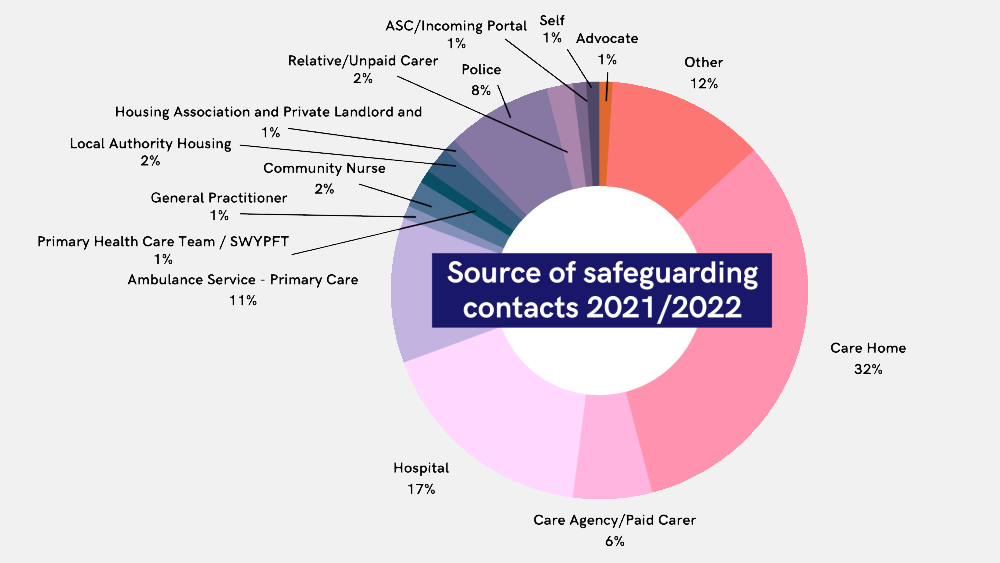
Barnsley Hospital has committed to increase knowledge of safeguarding adults to all staff by providing training, resulting in a 6% increase in the number of adults referred in 2021/22.
A change to the screening processes at the Adult Social Care front door has reduced the number of referrals from South Yorkshire Police being incorrectly recorded as safeguarding concerns. This work has helped adults get the right support for them in a timely manner, making sure concerns are directed to the right team, whether that's safeguarding, social care assessments or other local support.
Our commitment to improving the quality of data available has reduced the percentage of concerns listed as 'other' from 14% to 12%. This year, we've seen other housing providers and advocates being identified as referrers for the first time in our annual report.
Referrals from doctors and other primary care staff remain at 3% of the total number of concerns received. However, a greater percentage have resulted in a safeguarding enquiry, demonstrating the high-quality referrals sent by GPs and practice staff. Work continues with GPs as they're well placed to identify patients at risk of harm and abuse.
We're pleased to report that concerns reported by themselves, their family and friends increased each quarter. This indicates that the impact of our communications strategy, including promoting Safeguarding Awareness Week, is reaching Barnsley citizens and supporting them to contact us for help and support.
Location of harm
Locations of alleged abuse in 2021/22:
- Care home - 40%
- Own home - 42%
- Hospital - 7%
- Community setting - 5%
- Other - 6%
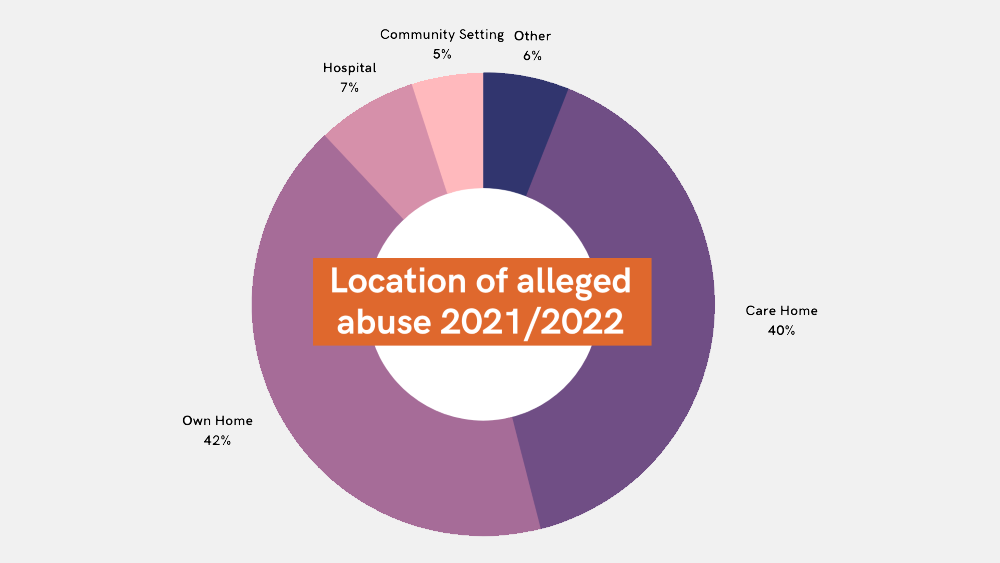
We're planning to increase awareness of adult safeguarding in the community to increase the number of referrals relating to adults living in their own homes in 2022/23.
The percentage of cases in people’s homes has dropped from 51% to 42%, as this is not directly linked to an increase in the number of adults living in care homes. The Safeguarding Board is committed to protecting people from harm and abuse in the community and encourages everyone to look out for their families, friends and neighbours.
Safeguarding starts with a conversation with the adult to explore what help they want and how we can support them to feel safer in the future.
The concerns listed as hospitals include private hospitals in Barnsley, not just Barnsley Hospital.
What type of harm was reported and experienced?
Abuse type in 2021/22:
- Neglect - 45%
- Physical - 15%
- Financial - 13%
- Emotional/psychological - 9%
- Institutional - 4%
- Sexual exploitation - 3%
- Domestic - 3%
- Self-neglect - 7%

Over the past year, we've seen a rise in the number of neglect and physical abuse cases recorded in Barnsley.
We're working to promote the support available for our borough's carers and to increase the public's ability to tell us if they're worried about their neighbours, friends or family.
We continue to work closely with our care providers, commissioners and the Care Quality Commission (CQC) to help them deliver high-quality care to adults in both care homes and their own homes.
Our work to help support adults struggling with self-neglect and hoarding has developed significantly over the past year, and we are delighted to see effective partnership working in place to help address this issue.
The board has been regularly updated on the impact of COVID-19, working together to identify solutions which minimise the risk to adults receiving care.
Safeguarding enquiries – helping adults to stop harm and to feel safer
Enquiries in 2021/22:
- Concern - 68%
- Proceed to Section 42 - 31%
- Met stage 3 - 1%
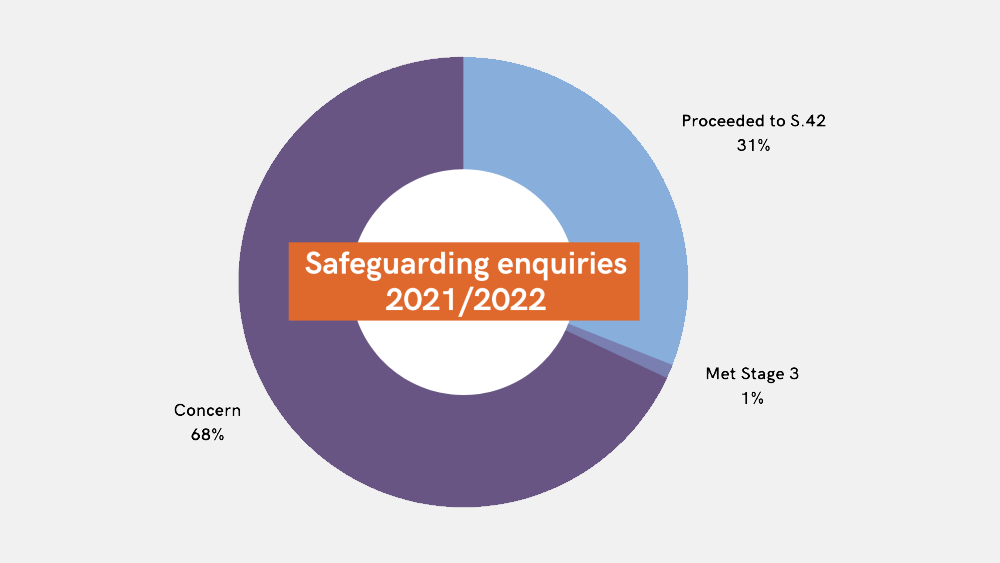
A Section 42 enquiry begins when an adult meets the three-stage test and agrees that they want help to stop or reduce the risk of harm.
Where an adult is unable to make the decision, for example, because of dementia, we'd use the Mental Capacity Act to confirm that they're unable to make this decision and decide if it's in their best interests for safeguarding to keep them safe.
Our safeguarding responses are very similar to previous years and in line with national averages, which suggest that 33% of safeguarding concerns result in safeguarding enquiries.
- 686 adults were supported to stop harm and abuse by a multi-agency safeguarding enquiry (Section 42). The majority were aged 65 plus.
- Demographically, the 684 adults supported by a Section 42 response are shown below; this is in line with our population demographic:
- Race:
- 80% of adults supported were white British
- 2.52% identified as black and minority ethnic
- Gender - the increase of referrals about men, noted in the 2020–2021 annual report, has continued to increase:
- women supported by safeguarding - 57%
- men supported by safeguarding - 43%
Barnsley is in line with both regional and national comparators for gender.
- Race:
Did we help adults feel safer?
Safeguarding aims to stop or reduce the risk of harm and to make people feel safer, if possible, by supporting them to be active partners in resolving the issues they face.
In 2021/22:
- removed - 37%
- reduced - 56%
- remains - 7%
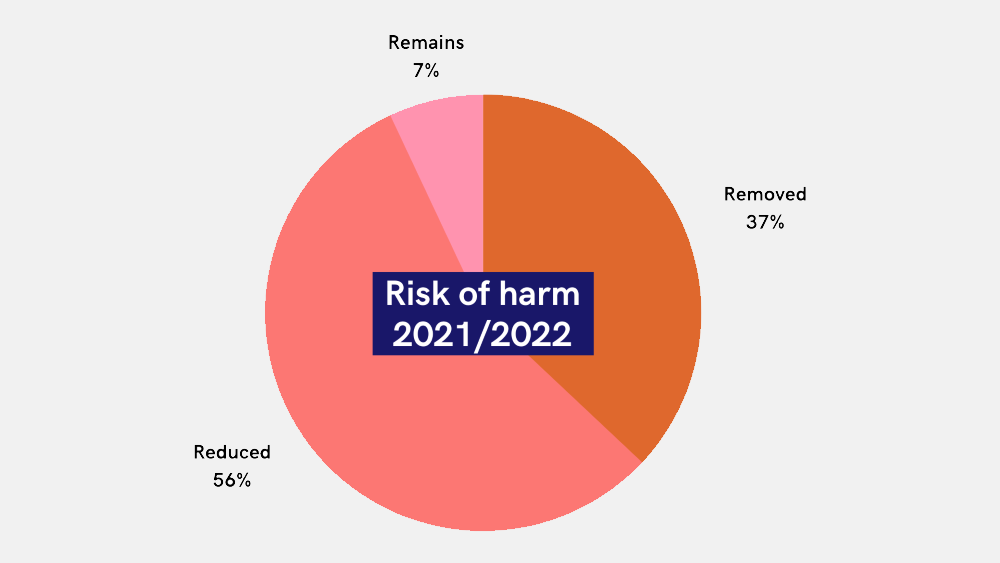
In 2021/22 we removed or reduced the risks for 93% of the adults we supported.
Adults can choose to continue to have relationships with people who pose a risk to them, including family members and friends. Seven percent of adults valued these relationships more highly than the risks posed to their safety. In these cases, we advised them to contact us if they wanted support in the future to address the risk of harm and/or abuse.
If a worker or volunteer is identified as the source of harm, a safeguarding enquiry will always take place, irrespective of the views of the adult. This is in line with our duties under the Care Act (2014) to respond to 'people in positions of trust', which includes workers or volunteers who may pose a risk to other adults.
Preventing harm and abuse
We're committed to preventing harm and abuse of adults in Barnsley. We do this by making sure that the services we provide are of a good quality and support adults to feel safe.
Barnsley remains well ahead of both regional and national comparators in the data provided to the Department of Health. The data is recorded in the Adult Social Care Outcomes Frameworks (ASCOF).
People who use services in Barnsley who say they feel safer - comparison of local/regional and national data
| Year | Barnsley | Region | England |
| 2017/18 | 73.4 | 69.6 | 69.9 |
| 2018/19 | 75.1 | 71.6 | 70 |
| 2019/20 | 73.2 | 69.7 | 70.2 |
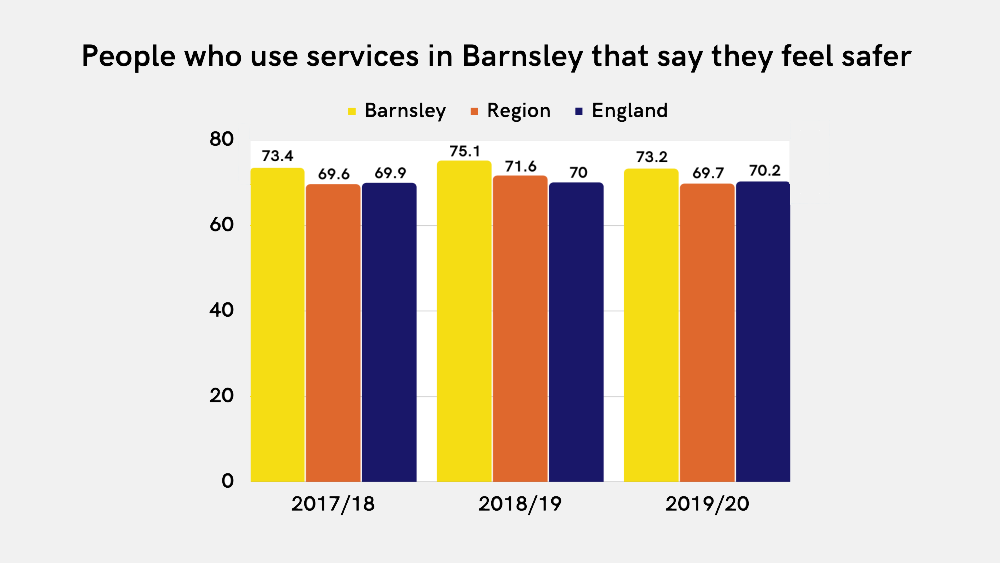
The data for 2020/21 is not published until October 2022.
People who use services who tell us they help them feel safe and secure - local, regional and national performance
| Year | Barnsley | Region | England |
| 2017/18 | 94.8 | 88.3 | 86.3 |
| 2018/19 | 97.1 | 88.5 | 86.9 |
| 2019/20 | 91.6 | 86.7 | 86.8 |
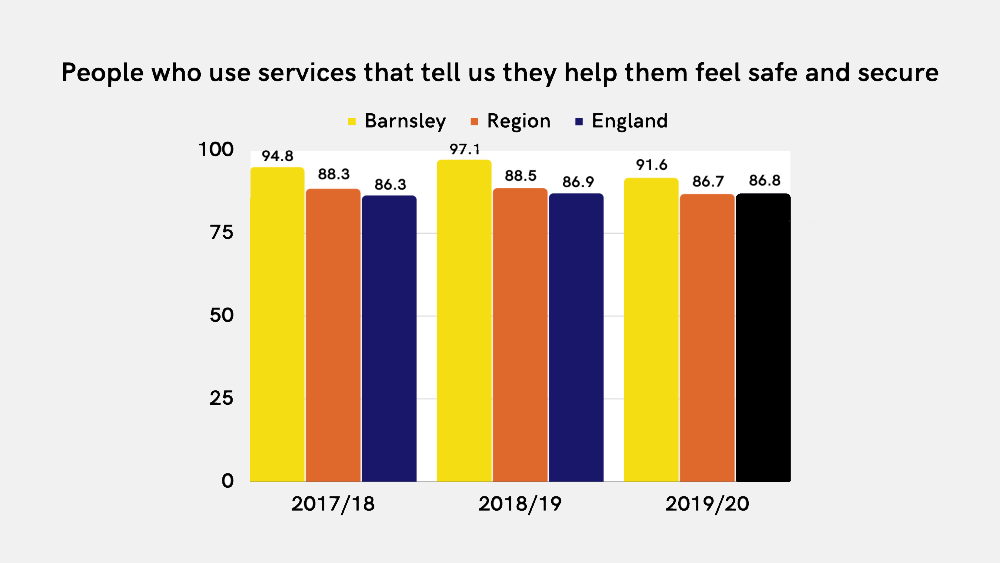
The data for 2020/21 is not published until October 2022.
Case studies
Emma
(Please note these are not the real names of the individuals involved)
Helen
(Please note these are not the real names of the individuals involved)
James
(Please note these are not the real names of the individuals involved)
Key achievements
| Achievement | Details | Impact |
| Safeguarding adults education programme | A high-quality programme has been established, offering workers and volunteers free education and training virtually via Teams or face-to-face. As a result of this training post, Barnsley is now actively involved in shaping the South Yorkshire education programme. |
The Safeguarding Adults Board can monitor which organisations are accessing training and how this impacts the quality of the safeguarding support we offer. We can influence the content of regional conferences to meet the needs of Barnsley workers and volunteers. |
| South Yorkshire safeguarding adults launch event | In 2021, we held our first South Yorkshire-wide event at Northern College, where colleagues from across the region benefitted from specialist input and shared their experiences of:
|
The format was so successful that the event will be repeated in 2022, hosted by another regional local authority. Locally, a task and finish group has been created to improve the support we offer young people who may struggle to be safe adults or effective parents. |
| Safeguarding Awareness Week | Radio advertising brought safeguarding messages into people’s homes and cars, with the aim of supporting people in Barnsley to share concerns about themselves, their families, or neighbours. A joint leaflet explaining adults’ and children’s safeguarding was produced and kindly shared by market stall holders during the week. The leaflet was also shared at several public-facing events. We saw a strong social media presence by all Safeguarding Adults Board partners during the week and supplemented by ongoing campaigns during the year. |
The leaflet is available in care homes, pharmacies and support organisations across Barnsley. We'll continue to extend its availability across the borough. The SAFE customer group have agreed to deliver local public information events throughout the year. The Safeguarding Adults Board have agreed to fund a customer engagement post to improve the safeguarding knowledge of community groups and their ability to prevent and respond to safeguarding concerns. |
| Partnership boards working together | A development event bringing together six boards took place to support us in working effectively on topics impacting us. These include domestic abuse, homelessness, modern slavery, and neglect. | We'll develop our ability to work together on shared issues by changing our meetings, creating shared data resources and building feedback mechanisms to reduce duplication and improve our ability to keep people in Barnsley safe. |
| Safeguarding adults peer review | The Barnsley Safeguarding Adults Board invited the Local Government Association to review how well we safeguard adults and help us develop an action plan for any improvements needed. We'd like to thank all our colleagues who took part in this and shared their views. |
Initial feedback says we're doing well and confirmed areas we'd previously identified for improvement. When the full report is produced, it'll be used to inform our strategy and work plan for the coming year. |
| New guidance and policies developed | Our guidance and policies are regularly reviewed and updated to support workers and volunteers to keep adults safe in line with best practice. | Workers and volunteers always have access to current policies and guidance. |
| Increase in the number of self-neglect and hoarding cases positively resolved | Learning from recent cases, new policies and a commitment to partnership working has led to an increase in the number of adults supported to resolve the risks linked to their self-neglect and/or hoarding. The customer-led hoarding support groups have been positively received. |
Adults and workers are reporting that self-neglect and hoarding issues are being resolved. Only one safeguarding adults review request, following the death of an adult linked to their self-neglect, was received in the year. |
| Research | The Safeguarding Adults Board has agreed to be part of three national research projects:
|
We'll benefit from the learning and resources produced because of the research, and this will improve local practice. Care homes will be supported to manage medication in line with best practice. |
| Subgroups development event | The subgroup members met to evaluate their performance and explore if changes could be made to membership, developing new relationships and priorities to improve their ability to deliver to keep adults in Barnsley safe. | The workplans for each subgroup have been amended and are regularly reviewed to help keep adults in Barnsley safe from abuse. |
Safeguarding Adults Reviews (SAR) and lessons learnt
The Care Act (2014) requires safeguarding boards to "consider all deaths or ‘near misses’ of adults we know or suspect were being abused or at risk of abuse, and partners may not have worked together to prevent the harm."
The Safeguarding Adults Review Panel meets monthly to consider all referrals, and Barnsley is committed to reviewing cases that don’t meet the SAR criteria where we feel that we can improve practice by completing a lessons learnt review.
SAR - Lola
Lola, an adult with learning disabilities, was admitted to the hospital emaciated and dehydrated from her family home, who had been her carers. Lola required an intensive care bed and remained in hospital for many weeks. South Yorkshire Police interviewed the family about possible wilful neglect of Lola, and Adult Social Care offered support to two elderly relatives living in the household who were reliant on Lola’s parents for care and support.
Several opportunities were missed to seek Lola’s views in previous contacts with the family, as the professional was too accepting of the families’ views that neither Lola, nor they, required any support. Most professionals didn't have a conversation with Lola on her own to establish her views and wishes. Failure to support or bring Lola to her appointments did not generate the expected level of professional curiosity about her circumstances. Work has been commenced, in collaboration with GPs and the Health and Wellbeing Board, to improve our ability to track and respond to adults with learning disabilities who are not brought to health appointments.
Lola has made good progress and is living in supported accommodation, where she's developing skills in cooking and budgeting. Her social network has grown, and she reports that I'm alright now to be here. Listening to music and having a nice chilling time in my bed.
You can read the full report regarding Lola or the seven-minute briefing about Lola.
(Please note these are not the real names of the individuals involved)
SAR - Mr J
Mr J died in hospital because of his non-engagement with health services, also known as self-neglect. He had a long history of mental ill-health and struggled with relationships, in part because of his inability to manage his emotions or money. Mr J was a probation client, and they referred his case to the Safeguarding Adults Review Panel.
A review has commenced and a report will be published in autumn 2022.
(Please note these are not the real names of the individuals involved)
Learning review: Adult F
Adult F, aged 18, died at home following a fall in the bathroom.
F lived with his mother, and his father was a regular feature in his life. Historical social care referrals began when F was six, reporting verbal and physical abuse by his mother and father. Later, when he was a teenager, there became counter allegations of fights and F returning his mother’s abuse.
He was in 'child in need planning' at the age of nine and 13 to 15 years. He was known to Children’s Services when he was 16 and 17. There were additional concerns about his health, parents not attending appointments and a lack of engagement with professionals.
He suffered broken bones through playing on two occasions, but wasn't taken to hospital for over a week after the injuries occurred. F was referred to CAMHS and for Prada Willi tests in 2015. He had moderate learning disabilities and was isolated at school with few friends, relating to the staff better than the other children.
He raised concerns over his weight and self-harming (picking skin) with the school nurse. His parents did not follow up on medical tests or follow health advice for F, and failed to engage with CAMHS after his first appointment. F was morbidly obese at the time of his death.
As adult services held no information on the case, Barnsley Safeguarding Children’s Partnership was asked to complete the review into his death. Key learning included:
- Support or plans for cases with insufficient movement to be peer-reviewed to help ensure progress to effective outcomes.
- Share best practice strategies to address barriers and encourage family engagement.
- Outline of the deep dive as a case study in neglect awareness and family engagement skills training.
- Recording systems and professional curiosity to support information sharing between services.
- Audit findings to inform the Neglect Strategy.
You can read a seven-minute briefing on Adult F’s case.
(Please note these are not the real names of the individuals involved)
Learning review: Gillian
We commenced a learning review into the circumstances of Gillian, an adult with learning disabilities, who was found in her family home with her deceased mother, who had died of natural causes. Her mother had been dead for several days before the police were contacted by a concerned neighbour and broke into the property.
The police found Gillian distressed, unable to provide her name or other information about other family members. As a result, they took Gillian to a mental health hospital for an assessment.
The review identified concerns about highly sexualised behaviour going back to childhood and an ongoing refusal to wear clothes. Gillian had very poor physical and oral health and had not been seen by medical services for several years. Gillian had a learning disability diagnosis as a child, but this did not result in transition into adult services.
The review identified several areas for development:
- Assessments, including mental capacity assessments, must be completed on adults who are thought to lack the capacity to make these decisions, irrespective of the views of family members. Where possible, an advocate should be appointed to support the adult in expressing their views if possible.
- Non-attendance of health appointments, especially annual learning disability health checks, must be escalated and, if necessary, result in a safeguarding concern being shared with Adult Social Care. A ‘was not brought’ policy is being worked on, and this will support the escalation of concerns linked to non-attendance of all health appointments.
- Family assertions must be ‘tested’ to check their validity when an adult with learning disabilities is involved. Gillian’s mother claimed that she attended college and was a volunteer with a local charity. However, there was no evidence supporting either of these claims.
- The creation of training and guidance to support workers to demonstrate persistence and professional curiosity when working with difficult to engage family members is being considered.
You can read a seven-minute briefing on Gillian’s case.
(Please note these are not the real names of the individuals involved)
Learning review: Provider case
The Care Quality Commission identified concerns about the safety of services provided by a private organisation in Barnsley. Neither Barnsley Council nor the South Yorkshire Integrated Care System had a contract with them to place young people in their unit.
The provider offered support to people aged 16 and over, but it was not registered with Ofsted as the care extended until at least the age of 25.
Concerns identified:
- All adults in the unit were placed by local authorities outside the borough, which meant social workers or families didn't regularly see them.
- Inappropriate and excessive use of restraint was regularly used by staff.
- High levels of violence between residents.
- High levels of self-harm and absconding.
- Staff were not skilled to work with these young people, and some had not received the required Disclosure and Barring Service (DBS) and pre-employment checks.
- Safeguarding children’s concerns about the young people under the age of 18 were not shared with Adult Social Care. However, they were shared with the placing social worker and local authority.
- None of the young people were registered with a local GP.
Learning identified includes:
- The CQC and commissioning colleagues must share details of providers in Barnsley who do not have an existing commissioning relationship.
- Records are created in the adult social care system to track low-level and safeguarding concerns so we can share them with the placing agencies.
- Exploring the role of GPs in working with providers who have no commissioned relationship with Barnsley Council or South Yorkshire Integrated Care System.
- The risks of out-of-area placements in non-commissioned services are shared at all relevant forums, including adult and children’s commissioning and the Yorkshire and Humber ADASS.
- Barnsley will adopt an out-of-area checklist to protect adults placed outside of the borough.
A learning brief will be published by mid-August 2022
Ambitions for 2022/23
- Develop our ability to work with all boards and partnerships in Barnsley to keep adults safe.
- Improve the knowledge and confidence of members of the public to recognise and report safeguarding concerns, to be our eyes and ears.
- Use early learning from research to inform practice.
- Gather evidence that training is making a difference in practice.
- Use learning from the peer review to inform the development of our 2022/23 work plan.
- Deliver a community-based Safeguarding Awareness Week in November 2022.
- Be ambitious in our desire to learn from practice, not just when cases meet the criteria for a Safeguarding Adults Review.
Board budget
Financial position of Barnsley Adult Safeguarding Board 2021/22:
| Type | Income | Expenditure |
| Employee costs | - | 93,066 |
| Public transport | - | - |
| Supplies and services | - | 24,217 |
| Business support | - | 21,784 |
| NHS South Yorkshire Integrated Care System | 26,642 | - |
| Miscellaneous contributions | - | - |
| Police and Crime Commissioner | 20,429 | - |
| BMBC | 51,002 | - |
| Underspend carried forward | 40,994 | - |
| Total | 139,067 | 139,067 |
The underspend of £40,994 has been carried over to 2022/23, with the agreement of the Barnsley Safeguarding Adults Board. This underspend is due to the late recruitment of a new part-time multi-agency trainer and the temporary reduction in hours for another employee.
Board structure
- Independent Chair
- Barnsley Safeguarding Adults Board
- Performance Management and Quality Assurance Subgroup (Chair: Healthwatch)
- Learning and Development Subgroup (Chair: Barnsley Council)
- Safeguarding Adults Forum by Experience (Chair: Member of SAFE)
- SAR and DHR Sub Committee (Chair: Independent Chair of BSAB)
- Pathways and Partnership Subgroup (Chair: Adult Social Care)
- Barnsley Safeguarding Adults Board
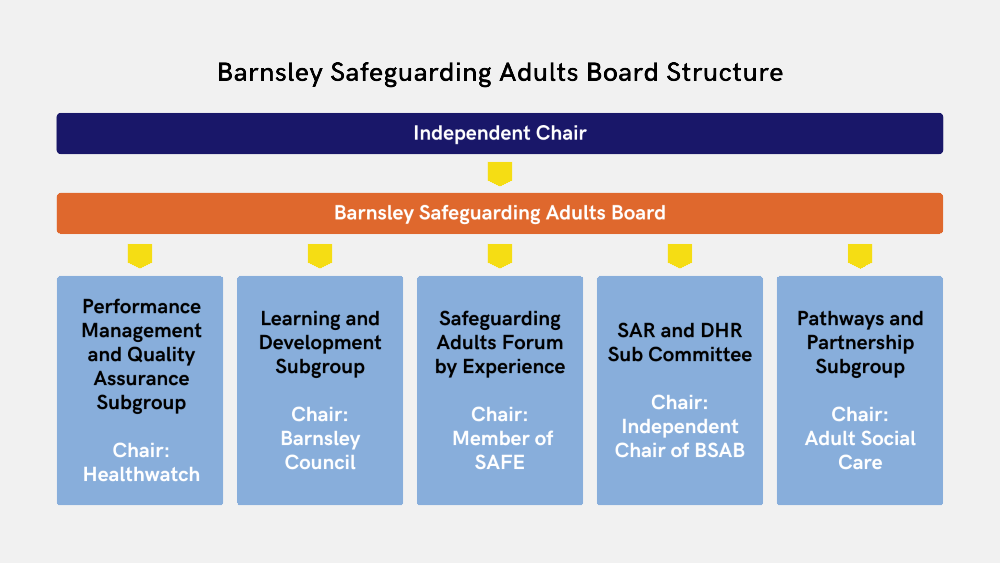
Board partners
Thanks to all our partners who have worked with us to demonstrate what they are doing to prevent harm and abuse every day.
- Barnsley Carers Service
- Barnsley College
- Barnsley Council
- Barnsley Hospital NHS Foundation Trust
- Barnsley Safeguarding Children's Partnership
- Berneslai Homes
- Care Quality Commission
- Centrepoint
- Department for Work and Pensions
- Healthwatch Barnsley
- Humankind
- IDAS
- National Probation Service
- NHS England
- NHS South Yorkshire Integrated Care System
- NHS South West Yorkshire Partnership
- Northern College
- Recovery Steps
- South Yorkshire Fire and Rescue
- South Yorkshire Police
- South Yorkshire Police and Crime Commissioner
- Umbrella

